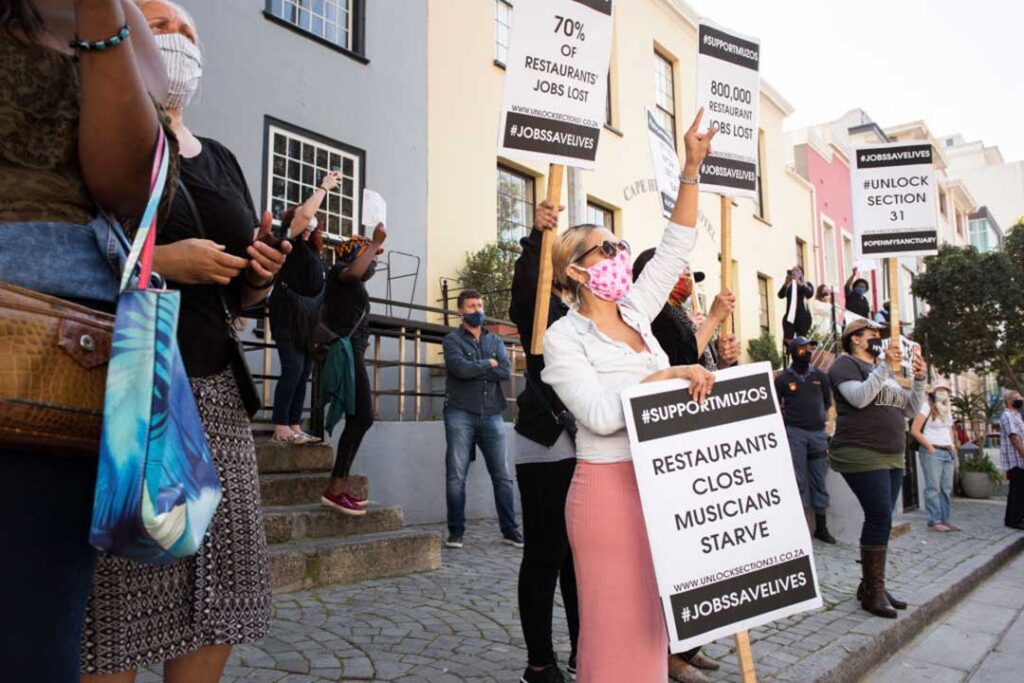ADF STAFF
With its fast-moving, omicron-fueled fourth wave of COVID-19 in retreat, South Africa’s government recently announced it was lifting a nighttime curfew after nearly two years.
Rescinding the midnight-to-4 a.m. curfew is part of the government’s changing approach that aims to manage the pandemic without damaging the economy.
“Based on the experts, the conditions do allow that we lift the curfew,” Minister in the Presidency Mondli Gungubele said during a news conference. Gungubele’s predecessor, Jackson Mthembu, died from COVID-19 in January 2021.
The new approach coincided with a 30% drop in new COVID-19 cases in late December and lower rates of hospitalization among those who were infected.
Along with discontinuing the nighttime curfew, other changes included:
- Allowing indoor gatherings of up to 1,000 people.
- Allowing outdoor gatherings of up to 2,000 people.
- Allowing alcohol sales after 11 p.m.
- Continued mandating of masks in public places.
“The risk of increase in infections is still high, given the high transmissibility of the omicron variant. Government therefore calls on all organizers of these gatherings to ensure that all health protocols are observed at all times and that all attendees are encouraged to be vaccinated,” Gungubele announced.
Even as South Africa relaxes its restrictions, much of the continent continues to see its omicron-related infections rising. North Africa is a hot spot, with cases rising 44% in early January. Algeria and Tunisia are among eight countries reporting a fifth wave of infections.
Health experts estimate that as much as 80% of South Africans have been exposed to COVID-19, providing them with some natural immunity to omicron and other variants.
Because of that, virologist Wolfgang Preiser of Stellenbosch University said South Africa’s experience should not be taken as the model for other countries, especially those in the Northern Hemisphere where winter is in full swing.
“That’s why you can’t say, ‘We hope things go the same way as in South Africa,’” Preiser said.
Dr. John Nkengasong, director of the Africa Centres for Disease Control and Prevention, said South Africa’s change in tactics is not a sign the pandemic has ended or that COVID-19 has become endemic. With average case positivity rates running around 11%, the virus is still very much in its pandemic phase, he said.
“I don’t believe we have brought it down to a certain level that we can live with,” Nkengasong said during his weekly news briefing.
But, he added, South Africa’s decision offers “a big public health lesson to learn.”
Supporters of the government’s new approach to COVID-19 described it as pragmatic.
“This reflects acceptance that governments will increasingly be looking for ways to live with the virus cognisant of the detrimental indirect effects that restrictions have been having on the economy, livelihoods and other aspects of society,” Shabir Madhi, a member of the South Africa Medical Research Council, wrote in The Conversation.
Acknowledging that reality is particularly important in South Africa, which experienced its worst economic contraction in nearly three decades.
The new approach also lets the government focus its pandemic efforts on targeting outbreaks with focused lockdowns should new variants emerge, said Dr. Matshidiso Moeti, director of the World Health Organization’s Africa regional office.
“It lends itself to a more localized, decentralized decision-making informed by data,” Moeti said. “Because the state of emergency is lifted, that doesn’t mean restrictions can’t be reimposed locally.”

